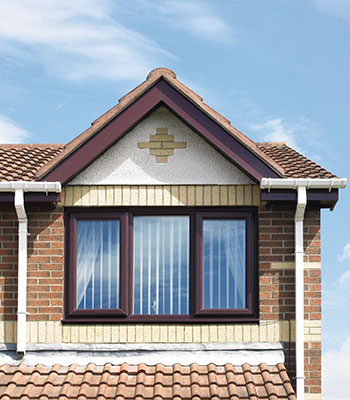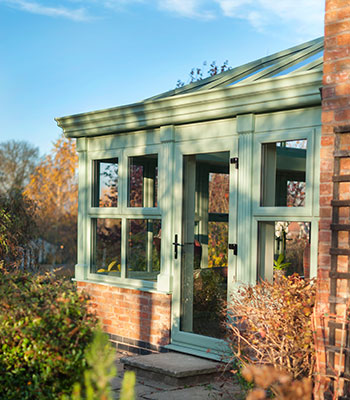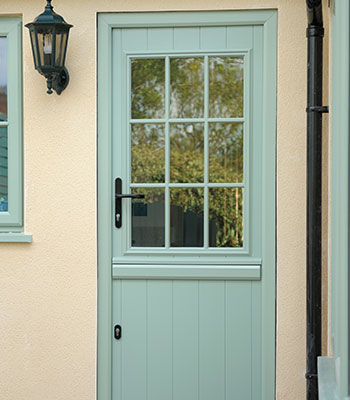Everything you need to know about the double glazing and conservatory industry in the UK
At Insight Data, we have extensive experience when it comes to all things double glazing and fenestration within the UK. Providing unmatched databases addressing all the major facets of the industry. Not only that, but we have also recently released our comprehensive 2021 State of the Industry Report.
Here, we go in-depth to cover everything you need to know when it comes to the UK double glazing and fenestration industry.
The term ‘double glazing’ refers to windows and doors that are fitted with a sealed unit, comprising two panes of glass with what is known as a ‘spacer bar’ around the edge. The edge is then sealed with a special sealant to prevent air and moisture from entering the sealed unit. Desiccant is then incorporated within the unit to absorb any moisture present at the time of sealing.
The full name of this sealed unit is known as a hermetically-sealed insulation glass unit (IGU). Triple glazing simply adds another pane of glass and spacer bar to the process. Insight Data has a specialist database of IGU manufacturers.

Although the first double-glazed units were experimented with during the 1950s, it was in the early 1980s that the double-glazing industry took off. Windows had, until that time, been manufactured in steel (e.g. Crittall windows) or timber. Companies such as Stormseal, Thermostore, Anglian Windows, Everest Double Glazing, Zenith and Staybrite emerged as national suppliers of aluminium windows and doors fitted with sealed units.
The late 1980s and early 1990s saw the rise of uPVC (or PVC-U) windows and doors. UPVC frames are manufactured from a thermoplastic polymer known as unplasticised polyvinyl chloride, a rigid and cost-effective plastic ideal for building materials.
Systems Companies
Both aluminium and uPVC windows and doors are manufactured from a series of profiles, typically five or six metres in length. They are then cut and crimped or welded together, such as the outer frame, sash, transom and beads. Together, the profiles make up one complete system, and the companies that design and manufacture them are known as extrusion or systems companies. There are around 25 main uPVC and aluminium extrusion companies that supply the UK market.
uPVC Systems Companies
- Eurocell
- Halo/Veka
- Rehau
- Epwin (Swish, Profile 22 & Spectus)
- Duraflex
- Profine (Kommerling and KBE)
- Selecta Profiles
- Deceuninck
- HL Plastics (Liniar)
- LB Plastics
- Aluplast
Aluminium Systems Companies
- Kawneer
- Comar Architectural Aluminium
- AluK
- Smart Systems
- Reynaers Aluminium
- Sapa Building Systems
- Senior Aluminium Systems (SAS)
- Metal Technologies
- Schuco
- Universal
- Technal
- Exlabesa
The systems companies supply businesses that manufacture the windows and doors, known as fabricators. Fabricators can range in size from those manufacturing just a few frames per week, to several thousand per week, often referred to as ‘super fabricators’.
Window and Door Fabricators
 Fabricators manufacture the finished window or door, cutting and assembling the profiles together and adding hardware (locks, hinges, handles) along with weather seals and gaskets.
Fabricators manufacture the finished window or door, cutting and assembling the profiles together and adding hardware (locks, hinges, handles) along with weather seals and gaskets.
In the UK there are around 4,500 window and door fabricators, of which some 1,500 fabricate uPVC and 800 aluminium. The rest are joiners or timber door and window manufacturers within the UK. Some double-glazing companies manufacture more than one material type. Insight Data has a specialist database of window and door fabricators.
Fabricators have several routes to market. They can supply and fit directly to the homeowner (retail/domestic market), such as Anglian or Everest. They may also supply the new-build market (housebuilders) or the commercial and public sector (local authorities, social housing, offices, shops, schools, hospitals, etc.).
Architects will often specify a particular window system or window specification when designing a commercial project. For those interested in the commercial sector, Insight has a specialist Architects Database.
Many fabricators also supply the trade, i.e. builders, double glazing companies or home improvement firms that do not manufacture but prefer to focus on sales and installation.
Window and Door Installers
There are over 12,500 specialist home improvement and double glazing companies that fit windows and doors in the UK, primarily in the domestic sector (homeowners). Most of these double glazing companies (about 11,000) do not manufacture, choosing instead to buy their products from a fabricator. Installers are often loyal to a particular window system brand and can vary in size considerably (from those installing under 25 frames per week to those installing well over 250 per week). Insight Data has a specialist database of window/door installers.
Many local builders will also install windows and doors, often as part of a refurbishment or extension, or while installing a new kitchen, bathroom or during renovation work. There is a growing trend for local builders to promote double glazing as an everyday service, rather than simply as part of a refurbishment project or extension. Insight Data has a specialist database of local builders, which can be segmented to target those in the home improvement sector.
We have a comprehensive database of over 4,200 fabricators and 13,300 installers across the UK to create highly targeted marketing lists for email marketing, direct mail, telesales or as a call list for your sales team. Get in touch if you’d like to find out more.
Conservatories & conservatory roof manufacturers
A conservatory consists of three primary elements – the base (or building work, including dwarf wall if required), the window and door frames, and the conservatory roof.
Conservatory roofs are a specialist-engineered product designed to withstand the elements and support the weight of the glazing material. The glazing can be polycarbonate or glass, or sometimes a conservatory will have a solid roof (such as slate or tile). The structure of the conservatory walls (including windows and doors) clearly needs to be structurally strong enough to support and secure the conservatory roof above it.
Similar to windows and doors, the roof is manufactured from a series of profiles, components and glazing materials (such as glass). Due to the structural requirements of a conservatory roof, the material tends to be aluminium or aluminium clad with uPVC.
Other than timber and low-budget DIY roofing products, there are a number of specialist conservatory roof systems, including Synseal Global, Ultraframe, K2, Eurocell Pinnacle and Quantal, who manufacture the roofs themselves and also supply a network of around 260 conservatory roof fabricators. Insight has a database of conservatory roof fabricators.
A variation of the conservatory is the orangery and this is growing in popularity. There are some 9,000 double glazing companies that install conservatories, most of which buy in their roofs from a roof fabricator. Insight has a database of conservatory installers.
Roofline
Many double glazing and home improvement companies have diversified into the roofline market, competing with builders and roofing contractors for the installation of fascias, soffits, guttering and cladding. Some of the major extruders of uPVC and PVC-UE (foam filled) include Kestrel/Celuform, GAP (Homeline), Freefoam and Swish. There are now over 7,000 companies that install roofline products, and Insight has a database of roofline installers.
Emerging Trends
There are a number of trends that Insight Data are monitoring, including the growth of composite windows (consisting of a combination of aluminium/timber, aluminium/uPVC, etc.). Some product developments in the home improvement/window industry are listed below.
Vertical Sliding (VS) Windows
Vertical sliding sash windows (also known as box sash windows) were a traditional timber product that used weights and pulleys to enable the window to slide up and down. Advances in u-PVC and aluminium have resulted in this product growing in popularity in these materials as an alternative to outward opening casement windows and continental-Europe style inward opening tilt and turn windows. Details of VS fabricators and installers are available on the Insight databases.
Bi-folding Doors
Folding and sliding doors are a rapidly growing market and are now often chosen as an alternative to patio doors and French doors. They enable larger openings within homes and conservatories, and consist of several (typically between three and seven) frames hinged together that fold back against each other in a concertina style. Details are within the Insight databases.
Composite Doors
 A composite door consists of a slab that is similar in appearance to a traditional timber door. The slab is constructed of a combination of materials, typically a thermoplastic, glass-reinforced plastic (GRP) or steel skin bonded to an engineered timber frame ‘skeleton’. It is typically filled with high-density foam (although it can also be solid), and the edge of the door slab is usually a uPVC/GRP or similar frame to prevent moisture penetration.
A composite door consists of a slab that is similar in appearance to a traditional timber door. The slab is constructed of a combination of materials, typically a thermoplastic, glass-reinforced plastic (GRP) or steel skin bonded to an engineered timber frame ‘skeleton’. It is typically filled with high-density foam (although it can also be solid), and the edge of the door slab is usually a uPVC/GRP or similar frame to prevent moisture penetration.
The slab is cut to size, fitted with the relevant glass if applicable, and fitted into a door frame along with the hardware (locks, handles etc). Until recently composite doors were manufactured by a small number of specialist fabricators, but this market is growing rapidly. This is particularly true as an alternative to traditional uPVC panel doors. A growing number of uPVC window and door fabricators are now manufacturing composite doors. Information on composite door fabricators and installers is contained within the Insight databases.
We are on the cutting edge of changes in the industry, you can head over to our Resource Centre to read expert information about GDPR, data reports and downloads.
Helping you target the right prospects
If you wish to target any of the markets or companies within the window, door, conservatory or building industry, Insight Data has the in-depth industry knowledge to help you. Our range of prospect databases is the most accurate, relevant and up-to-date available. You can also take advantage of our marketing services for direct mail, email marketing, telesales and design/print.
Our friendly team can offer you costings & demos, just get in touch with us via our contact form or give us a call on +44 (0)1934 808 293.







